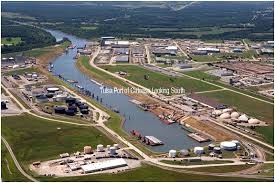
Oklahoma Senator Jim Inhofe praised President Trump on Tuesday for signing S. 140, which reauthorizes the Coast Guard for 2018 and 2019. Inhofe authored Section 819 of S. 140, which directs the U.S. Coast Guard to create a plan to replace aging inland waterways and river tender vessels, which are responsible for maintaining the navigation aids and buoys that mark water channels.
Also included in the U.S. Coast Guard reauthorization bill was legislation that Inhofe originally co-sponsored. S. 168, Commercial Vessel Incidental Discharge Act (CVIDA) of 2017, directs the establishment of a uniform national standard for ballast water and other vessel discharges.
“I am incredibly pleased the president signed the Coast Guard reauthorization and Vessel Incidental Discharge Act today,” said Inhofe, who is a key member of the Senate Commerce, Science and Transportation Committee. “This bill includes a provision I authored that will support economic activity at our inland ports, like the Port of Catoosa or the Port of Muskogee, by directing the Coast Guard to develop a plan for the acquisition of new inland waterway vessels, which will improve navigation operations and efficiencies along the MKARNs. With the president’s signature, this legislation will empower the Coast Guard to combat trafficking and drug smuggling along our nation’s coast. Furthermore, this legislation provides for a predictable national standard for businesses operating on our nation’s maritime highways—like the MKARNS—reducing duplicative federal regulations that have held back economic growth.”
When the legislation passed through the Committee, Inhofe’s provision received praise by the American Waterways Operators, the Tulsa Port of Catoosa and Kirby Cooperation, which is one of the nation’s largest maritime transportation companies.
“A modernized, robust fleet of Coast Guard inland waterway and river tenders is vital to the safety and efficiency of navigation in maritime commerce, a fundamental pillar of our national economy,” said Craig F. Montesano, vice president of legislative affairs for the American Waterways Operators.
“The Port of Catoosa is very appreciative of the legislation passed by the Senate Commerce Committee today reauthorizing the U.S. Coast Guard,” said David Yarbrough, port director of Tulsa Port of Catoosa. “It is particularly pleasing to see the inclusion of a provision, authored by Sen. Inhofe, directing the U.S. Coast Guard to begin plans to replace their aging fleet of inland waterway and river tenders. Many people are unaware of the critically important work that the U.S. Coast Guard performs on the nation’s inland rivers, ensuring safe navigation for commercial and recreational traffic. The reliability of these river tenders is crucial to the navigation industry and the Nation’s transportation network.”
“We have many electronic tools today that help us navigate. But in the inland river system, where currents and shoals can change on a daily basis, buoys, and the inland tenders that maintain them, remain a critical component of navigation safety,” said Jim Guidry, executive vice president for vessel operations of Kirby Corporation. “We are excited to see progress toward recapitalizing the inland buoy tender fleet. It is long overdue. Kirby Corporation strongly supports the Commercial Vessel Incidental Discharge Act (CVIDA). We are prepared to invest in ballast water treatment systems that can meet the highest achievable standards. However, once we make that investment, we need to know that system will be accepted in every American port of call. Without CVIDA, we could be subjected to multiple inconsistent standards on a single trip as we pass from state to state.”






